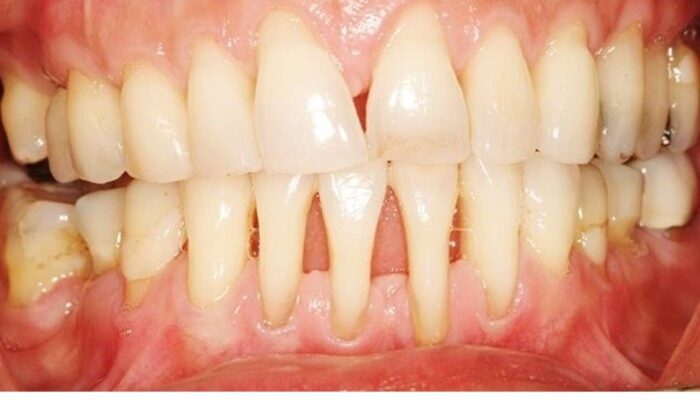
How to cure gum disease without a dentist – Are you battling gum disease and seeking relief without the hefty cost of a dentist? Dive into this comprehensive guide and discover effective home remedies, lifestyle tweaks, and advanced options to restore your oral health and banish gum disease for good!
From understanding the causes to exploring natural remedies, practicing proper oral hygiene, making healthy lifestyle changes, and delving into advanced treatment options, this guide empowers you with the knowledge and strategies to tackle gum disease head-on and achieve a healthier, more radiant smile.
Identify Common Causes of Gum Disease
Gum disease, also known as periodontal disease, is a common condition that affects the gums and the supporting structures of the teeth. It is caused by a buildup of plaque and bacteria on the teeth, which can lead to inflammation, bleeding, and eventually tooth loss.
There are many factors that can contribute to gum disease, including poor oral hygiene, smoking, and underlying medical conditions. Let’s take a closer look at each of these factors:
Poor Oral Hygiene
Poor oral hygiene is the leading cause of gum disease. When you don’t brush and floss your teeth regularly, plaque and bacteria can build up on the teeth and along the gum line. This can cause inflammation and bleeding, and eventually lead to gum disease.
If you’re looking for ways to treat gum disease without breaking the bank, you’re in luck. There are plenty of effective home remedies for gum disease that can help you get your smile back on track. For more detailed information on how to cure gum disease without a dentist, check out this helpful guide that provides step-by-step instructions and additional tips for treating gum disease at home.
- Brushing your teeth twice a day with a soft-bristled toothbrush and fluoride toothpaste is essential for removing plaque and bacteria from the teeth.
- Flossing once a day is also important for removing plaque and bacteria from between the teeth, where your toothbrush can’t reach.
- Using an antiseptic mouthwash can also help to kill bacteria and reduce inflammation.
Smoking
Smoking is another major risk factor for gum disease. The chemicals in cigarettes damage the gums and make them more susceptible to infection. Smoking also reduces the amount of oxygen that reaches the gums, which can further damage the tissue.
- Quitting smoking is the best way to reduce your risk of gum disease.
- If you’re not ready to quit, try to cut down on the number of cigarettes you smoke each day.
Underlying Medical Conditions
Some underlying medical conditions can also increase your risk of gum disease. These conditions include:
- Diabetes
- HIV/AIDS
- Leukemia
- Crohn’s disease
- Ulcerative colitis
If you have any of these conditions, it’s important to talk to your doctor about how to manage your risk of gum disease.
Foods and Beverages
Certain foods and beverages can also contribute to gum disease. These include:
- Sugary foods and drinks
- Acidic foods and drinks
- Sticky foods
Sugary foods and drinks can feed the bacteria in your mouth, which can lead to plaque and gum disease. Acidic foods and drinks can erode the enamel on your teeth, which can make them more susceptible to decay and gum disease.
Sticky foods can get stuck in your teeth and provide a breeding ground for bacteria.
Explore Natural Remedies for Gum Disease

In addition to conventional treatments, natural remedies can provide relief from gum disease symptoms and promote oral health. These remedies have been used for centuries and have shown promising results in reducing inflammation, fighting bacteria, and improving overall gum health.
Saltwater Rinses
- Saltwater rinses are a simple and effective way to reduce inflammation and pain associated with gum disease.
- The salt helps draw out excess fluid from the gums, reducing swelling and discomfort.
- To make a saltwater rinse, dissolve half a teaspoon of salt in a glass of warm water and rinse your mouth for 30 seconds, twice a day.
Tea Tree Oil
- Tea tree oil is a natural antiseptic and antibacterial agent that can help fight the bacteria that cause gum disease.
- It can be used as a mouthwash by adding a few drops to a glass of water and rinsing for 30 seconds, twice a day.
- You can also apply a few drops of tea tree oil directly to the affected area using a cotton swab.
Probiotics
- Probiotics are beneficial bacteria that can help balance the oral microbiome and reduce the risk of gum disease.
- They can be found in fermented foods such as yogurt, kefir, and sauerkraut.
- Taking probiotic supplements or consuming fermented foods can help increase the number of beneficial bacteria in the mouth, which can help fight gum disease.
Discuss the Importance of Proper Oral Hygiene
Gum disease is a common problem that can lead to serious health issues if left untreated. One of the best ways to prevent and treat gum disease is to practice good oral hygiene. This includes brushing your teeth twice a day, flossing regularly, and using mouthwash.
Brushing your teeth twice a day helps to remove plaque and bacteria from your teeth and gums. Plaque is a sticky film that forms on your teeth and can cause cavities and gum disease. Bacteria can cause inflammation and infection in your gums.
Flossing Regularly
Flossing is another important part of good oral hygiene. Flossing helps to remove plaque and bacteria from between your teeth, where your toothbrush can’t reach. Flossing also helps to stimulate your gums and promote blood flow.
Using Mouthwash
Mouthwash can help to kill bacteria in your mouth and freshen your breath. Mouthwash is not a substitute for brushing and flossing, but it can be a helpful addition to your oral hygiene routine.
It’s no secret that gum disease is a pain. If you’re looking for ways to cure gum disease without a dentist, there are a few things you can do. First, try how to cure gum disease without a dentist . This can help to reduce inflammation and pain.
You can also try using a mouthwash that contains chlorhexidine. This can help to kill bacteria that cause gum disease. Finally, be sure to brush and floss your teeth regularly. This will help to remove plaque and bacteria that can lead to gum disease.
Regular Dental Checkups
Regular dental checkups are important for preventing and detecting gum disease early on. Your dentist can check your gums for signs of inflammation and infection. Your dentist can also clean your teeth and remove plaque and tartar buildup.
Identify Lifestyle Changes for Gum Disease Prevention

Gum disease is a prevalent oral health issue that can be prevented by adopting a healthy lifestyle. Certain habits, such as stress, smoking, and poor diet, contribute to the development of gum disease. By making positive lifestyle changes, you can reduce the risk of gum disease and maintain optimal oral health.
Reduce Stress
Chronic stress can have detrimental effects on overall health, including oral health. Stress can weaken the immune system, making the body more susceptible to infections, including gum disease. Engaging in stress-reducing activities such as exercise, yoga, or meditation can help manage stress levels and promote overall well-being.
Gum disease can be a pain, but it doesn’t have to be. There are plenty of ways to cure gum disease without a dentist, including using natural remedies like salt water rinses or tea tree oil. If you’re looking for more information on how to cure gum disease without a dentist, check out Wake Mecconline . They have a wealth of resources on all sorts of health topics, including gum disease.
With their help, you can get your gums back to health in no time.
Quit Smoking
Smoking is a major risk factor for gum disease. The chemicals in cigarettes damage the gums and blood vessels, reducing the flow of oxygen and nutrients to the gums. This can lead to inflammation, gum recession, and tooth loss. Quitting smoking is crucial for preventing gum disease and improving overall health.
Maintain a Healthy Diet
A balanced diet rich in fruits, vegetables, and whole grains provides essential vitamins and minerals for maintaining healthy gums. Vitamin C, in particular, is crucial for collagen production, which is a protein that supports the structure of the gums. Consuming a diet low in processed foods, sugary drinks, and refined carbohydrates can help prevent gum disease.
Gum disease is a common problem that can lead to serious health issues if left untreated. While it’s typically recommended to see a dentist for treatment, there are some things you can do at home to help cure gum disease.
Here are a few tips on how to cure gum disease without a dentist . These methods can help reduce inflammation, kill bacteria, and promote healing.
Explore Advanced Treatment Options for Severe Gum Disease

When gum disease becomes severe, advanced treatment options may be necessary to restore gum health. These treatments include surgical procedures that aim to remove bacteria, repair damaged tissue, and promote healing.
Scaling and Root Planing
Scaling and root planing is a non-surgical procedure that involves removing plaque and tartar from the teeth and below the gum line. This procedure helps to eliminate bacteria and smooth the root surfaces, making it more difficult for bacteria to adhere.
Flap Surgery
Flap surgery is a more invasive procedure that involves lifting the gum tissue away from the teeth to access and clean the roots more thoroughly. This allows for the removal of deep-seated bacteria and the correction of any bone defects that may be present.
Bone Grafts, How to cure gum disease without a dentist
Bone grafts may be necessary in cases where gum disease has caused significant bone loss. These grafts help to restore the bone structure and provide support for the teeth.
If you’re looking for ways to improve your oral health, you may have heard about how to cure gum disease without a dentist. While it’s true that there are some things you can do at home to help reduce inflammation and pain, it’s important to note that gum disease is a serious condition that requires professional treatment.
For more information on how to cure gum disease without a dentist, check out this helpful article: how to cure gum disease without a dentist . It provides detailed instructions on how to cure gum disease without a dentist, including natural remedies and lifestyle changes that can help improve your oral health.
Closure: How To Cure Gum Disease Without A Dentist
Remember, maintaining good oral hygiene, adopting a healthy lifestyle, and seeking professional help when necessary are crucial for long-term gum health. By embracing the tips and remedies Artikeld in this guide, you can effectively combat gum disease, prevent its recurrence, and enjoy a lifetime of optimal oral well-being.
Essential Questionnaire
Can I cure gum disease completely at home?
While home remedies can alleviate symptoms and improve gum health, severe cases may require professional treatment. Regular dental checkups are essential for monitoring progress and ensuring optimal oral health.
How long does it take to cure gum disease at home?
The duration depends on the severity of the condition and the effectiveness of the remedies used. Mild cases may show improvement within a few weeks, while more severe cases may require several months or even years of consistent treatment.
Is it possible to prevent gum disease from recurring?
Yes, maintaining good oral hygiene, quitting smoking, managing stress, and eating a healthy diet can significantly reduce the risk of gum disease recurrence.





